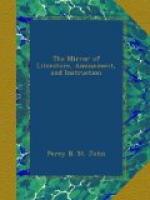This Engraving will be received by the attentive inquirer, as an interesting specimen of the sepulchral architecture of olden times; and, judging from the mutilated remains, its original beauty would have reminded us of the remark of an antiquarian writer,—that he never saw a fine monument out of England.
[Illustration: (Monument of a Crusader, in Winchester Cathedral.)]
[6] A tunick, or frock of
armour, with wide sleeves, reaching a
little
below the elbow, terminating with a broad, gilt border,
and
having a hood, not separate. Its first introduction
in armour
is
referred to the time of William II.
* * * * *
THE PUBLIC JOURNALS.
* * * * *
CHOICE APHORISMS.
(From 144, in Fraser’s Magazine.)
It is perfectly possible to make champagne from gooseberries, equal to that yielded by the grape. Exampli gratia: Lord Haddington, who is a first-rate judge of wines, had a bottle of mock and one of real champagne set before him, and was requested to say which was which. He mistook the product of the gooseberry for the genuine article; and many persons, reputed good judges, have done the same thing.
By putting a piece of lump-sugar, the size of a walnut, into the tea-pot, you will make the tea infuse in one-half the time. This fact is well known to bag-men and stage-coach travellers.
Members of dilletanti societies are generally especial asses: their eternal talk about the fine arts, drawing, colouring, harmony, composition, chiaro-scuro, fore-shortening, design, and so forth, is enough to turn the stomach of a horse. The thing is the more insufferable, because they absolutely know nothing of the subject, and have about as much real appreciation of works of genius as a pig possesses for the inventions of Watt or Daedalus.
While prigs of the above description are eternally chattering about such topics, men who are really eminent in the fine arts never say a word on the subject. Goldsmith describes this matter well in his account of Sir Joshua Reynolds:—
To coxcombs averse, yet most civilly steering,
When they judged without skill he was
still hard of hearing;
When they talk’d of their Raphaels,
Correggios, and stuff,
He shifted his trumpet, and only took
snuff.”
When I see a man who affects to doubt everything he hears, I never hesitate about writing him down an ass. A great doubter is a solemn and self-conceited prig. How amusing is it to see the blockhead shake his empty pate, compress his lips into a sneer, and turn up his absurd unmeaning eyes in dubious disbelief, when he hears aught which he thinks it would imply sagacity to discredit! Such persons imagine, that to be a great doubter implies wisdom; whereas, in their case, it has its origin in constitutional phlegm and stupidity.




